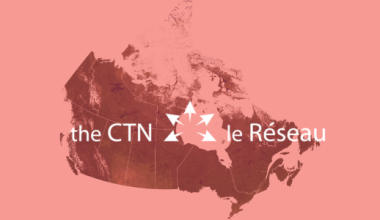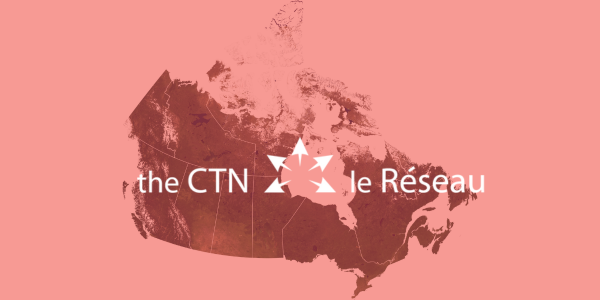“The first letter in HIV stands for Human,” writes Dr. Alexander McClelland in a co-authored 2020 paper outlining the ethical implications and potential harms of molecular HIV surveillance. Dr. McClelland, a person living with HIV and an assistant professor at the Institute of Criminology and Criminal Justice at Carlton University, sees an urgent need for a participatory and community-focused approach to understanding the complexities of this ongoing public health and research practice.
“Molecular HIV surveillance generally involves the secondary use of health information by public health authorities to track HIV cases and potentially intervene to prevent further transmission, often done without people’s knowledge or consent,” said Dr. McClelland, who joined the CTN as an investigator in June 2023.
For example, some provincial governments and public health units conduct genotyping analyses of samples collected during routine HIV testing, allowing them to detect new clusters of transmission and follow-up with specific people to initiate antiviral treatment. While this may sound like an ideal use of data to prevent new cases of HIV, he emphasizes that we need to have a thoughtful conversation about potential consequences before we adopt this strategy.
Dr. McClelland, who co-led a CTN-sponsored ancillary event at CAHR 2023 on the topic, says that the concern from the community is around people’s bodily autonomy and their right to decide whether they have this level of detailed surveillance.

CTN Investigator Dr. Alexander McClelland
In this context, both the patient and clinician may be unaware of how this information might be used in the future. Surveillance data can be shared with researchers, or can come from tests conducted for research purposes; this intersection between the public health and research realms means that there can be an ethical conflict between the two. “Should a researcher use data for writing papers and publishing work that is gathered without patient consent? Most researchers would say that’s questionable, but it’s become normalized with surveillance,” he said. “If you’re a doctor or a researcher, you have an ethical responsibility to your patients; this responsibility might be in tension with public health ethics, which is more focused on the population as a whole.”
“A common argument in support of sharing data in this way says ‘Oh, well, this is anonymized. There’s no way to identify any of the people in this study’,” said Dr. McClelland. “But they’re working with a genetic sequence, which is a unique and, in theory, identifiable fingerprint for each person’s virus. Plus, this data can be triangulated with detailed demographic and behavioural information with the intention of identifying people.”
From his perspective, we don’t necessarily need a new technological solution to know where transmission is occurring or how to intervene. “We know what type of interventions are required, but often they aren’t being rolled out appropriately: supportive housing, income security, and other kinds of structural interventions.”
“The work that I’ve done is not in any way saying molecular HIV surveillance is either a good or bad thing. It’s saying we need engagement with the people that it could impact,” he said.
HIV, Surveillance, and the Criminal Justice System
One of the potential dangers of HIV surveillance is the use of this information for HIV criminalization. “We don’t have HIV-specific laws in Canada, so we apply a general criminal law. This means that the charge of aggravated sexual assault is applied in the case of HIV non-disclosure prior to sex,” he said. “This is one the harshest charges in the criminal code and can result in a long sentence and being registered as a sex offender.”
Alongside groups like the Canadian Coalition to Reform HIV Criminalization, Dr. McClelland is working to advocate for HIV criminalization to be understood or applied only in cases where there was intent to transmit. “If we can remove HIV from being understood and governed under the purview of sexual assault laws, that would be a success,” he said.
Where criminalization and molecular surveillance intersect is the use of genetic analysis to argue the direction of HIV transmission. Even though this type of analysis cannot definitively prove transmission direction, Dr. McClelland notes that it may be accepted as evidence in court: “In 2008, a prosecution team in Canada used the open access Los Alamos genetic database as supportive evidence to successfully convict a man accused of non-disclosure. While the judge noted that the court could not use the data to prove infection, it was helpful ‘circumstantial evidence’ that could be accepted in future legal cases, especially as we focus more and more on viral suppression.”
More generally, he says that community members are worried about the use of molecular HIV surveillance of people who may be living with HIV who already face intensified criminalization, like people who use drugs, migrants, and sex workers.
Finding a path forward: New legal and ethical frameworks
So, what can be done to disentangle this complex ethical and legal conundrum?
Aside from ongoing legal work to reclassify HIV in the criminal code, Dr. McClelland’s new CIHR-funded project is mapping the blood and health information pathway and aims to answer the question: “Where does my blood and information go?”
Dr. McClelland and his community-based team are interviewing 30 to 40 infectious disease specialists, nurses, epidemiologists, and public health professionals in Ontario and British Columbia to understand how data is collected, shared, and used for secondary purposes, and will then share their findings widely.

According to Dr. McClelland, there is also a need to rethink data governance, access, and control using modern, innovative approaches.
“We need to look at things like data trusts and community-governed data projects to look at a more democratic way to govern data on HIV,” he said. “People living with HIV weren’t originally involved in setting directions for how data is used, and I would call on researchers to actively engage community members to have those conversations.”
Finally, he says that we need to rethink informed consent, pointing to the fact that our understanding of informed consent hasn’t kept up with the rapid pace of technological development, big data, and biobanking.
“We need to do a better job of understanding forms of dynamic consent and there needs to be research into opt-out approaches,” he said. “Consent can’t be a single check box.”
Dr. McClelland acknowledges the complexities we have to face in order to address these broad and systemic issues, but notes that our efforts to modernize must start with these difficult conversations.
“The logic of HIV prevention is rooted in treating HIV as something that is terrifying, that no one wants to get or have. Thankfully we have treatments that limit HIV to a chronic illness,” he said. “It’s not about the virus itself anymore, it’s about the social response to the virus.”






